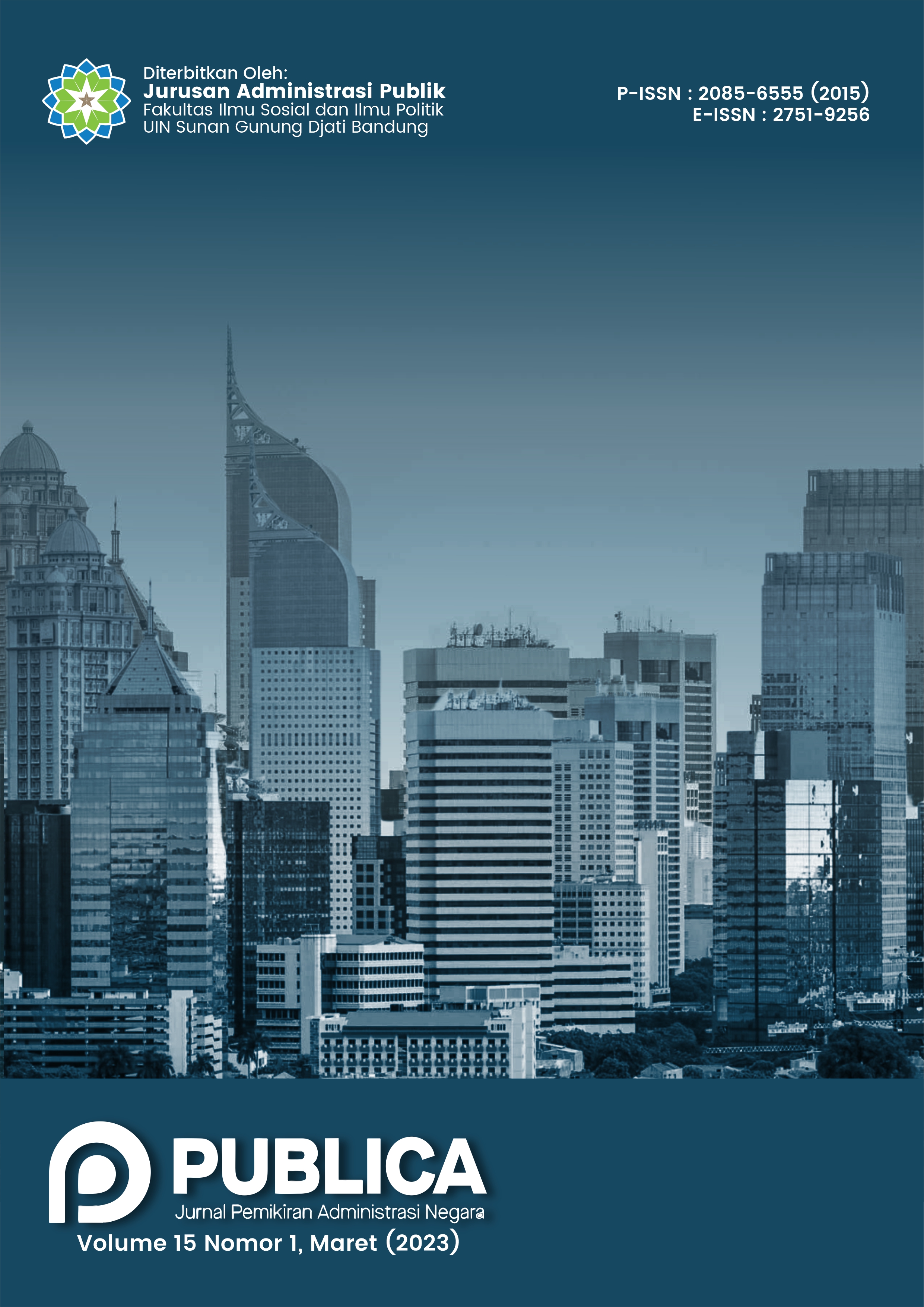Evaluation of the Implementation of Joint Business Group Assistance (KUBE) in Ternate City
DOI:
https://doi.org/10.15575/jpan.v15i1.24552Keywords:
Evaluation, Mentoring, Joint Business GroupAbstract
The simplest evaluation when it can gather information about the circumstances before and after the KUBE program is implemented. Ternate City itself received an allocation of 50 Joint Business Groups (KUBE) with a ratio of 5 companions where one companion has the task and responsibility of accompanying 10 groups because for 1 group there are 10 beneficiaries with details of assistance of 20 million for each group, it is necessary to evaluate the program assistance so that it can see the shortcomings to be corrected. The data analysis method used in this study is descriptive qualitative. Descriptive qualitative is a method used to explore findings in the field. The results showed that one government program that requires community participation is the Joint Business Group (KUBE) program for the poor to increase Productive Economic Enterprises (UEP), especially in increasing income, providing some of the needs that are needed, creating harmony in social relations between citizens, and as a forum for sharing experiences between members. Forthis reason, the companion is very important in providing knowledge, skills and experience to the fostered KUBE group. In practice, KUBE companions will provide an understanding to each member of KUBE social assistance recipients that there must be a sense of belonging to run a joint business so that they are independent of the business they are running because through this program they can be helped to start a business as a first step to achieve social welfare and economic improvement in a better direction.References
Abu, H. (2011). Pengorganisasian dan Pengembangan Masyarakat Model dan Strategi Pembangunan Berbasis Kerakyatan. Humaniora, Bandung.
Andi, A. (2019). Pengaruh Kompetensi Sumber Daya Manusia yerhadap KiManerja Pegawai Pada Dinas Kependudukan Dan Catatan Sipil Kota Tasikmalaya. Jurnal Sumber Daya Aparatur, 1(1).
Aprilia, H. (2009). Evaluasi Pelaksanaan Program Transmigrasi Lokal Model Ring I Pola Tani Nelayan di Bugel Kecamatan Panjatan Kabupaten Kulon Progo dan Gesing Kecamatan Panggang Kabupaten Gunungkidul (Doctoral dissertation, Universitas Gadjah Mada).
Briyant, C., Hagul, P., Simatupang, R. L., & White, L. G. (1987). Manajemen Pembangunan: Untuk Negara Berkembang. LP3ES.
Broadbent, J., & Guthrie, J. (1992). Changes in the Public Sector: A Review of Recent''Alternative''Accounting Research. Accounting, Auditing & Accountability Journal, 5(2), 0-0.
Davis, G., & Rhodes, R. A. (2020). From Hierarchy to Contracts and Back Again: Reforming the Australian Public Service. In Institutions on the Edge? (pp. 74-98). Routledge.
de Sousa, W. G., de Melo, E. R. P., Bermejo, P. H. D. S., Farias, R. A. S., & Gomes, A. O. (2019). How and Where is Artificial Intelligence in the Public Sector Going? A Literature Review and research agenda. Government Information Quarterly, 36(4), 101392.
Droege, H., Raggi, A., & Ramos, T. B. (2021). A Systematic Literature Review on Circular Economy Performance Assessment in Public Sector Organizations. The Role of Law in Governing Sustainability, 203-221.
Droege, H., Raggi, A., & Ramos, T. B. (2021). Overcoming Current Challenges for Circular Economy Assessment Implementation in Public Sector Organisations. Sustainability, 13(3), 1182.
Hendrikus, M. B. (2016). Implementasi Kebijakan Penanggulangan Kemiskinan melalui Program Pemberdayaan Fakir Miskin Kelompok Usaha Bersama. Tugas Akhir Program Magister.
Imandasari, R., Afifuddin, A., & Anadza, H. (2022). Efektivitas Program Pemberdayaan Masyarakat Miskin melalui Kelompok Usaha Bersama di Kota Malang. Respon Publik, 16(4), 63-68.
Jalal, F., & Supriadi, D. (Eds.). (2001). Reformasi Pendidikan dalam Konteks Otonomi Daerah. Diterbitkan atas kerjasama Depdiknas, Bappenas, Adicita Karya Nusa.
Kementerian Sosial, R. I. (2011). Pedoman Kelompok Usaha Bersama. Jakarta: Ditjen Dayasos.
Klein, N., Ramos, T. B., & Deutz, P. (2020). Circular Economy Practices and Strategies in Public Sector Organizations: An Integrative Review. Sustainability, 12(10), 4181.
Moleong, L. J. (2001). Moleong, Lexy J. Metodologi Penelitian Kualitatif, Bandung: Remaja Rosda Karya.
Picazo-Vela, S., Gutiérrez-MartÃnez, I., & Luna-Reyes, L. F. (2012). Understanding Risks, Benefits, and Strategic Alternatives of Social Media Applications in the Public Sector. Government Information Quarterly, 29(4), 504-511.
Radnor, Z., & Osborne, S. P. (2013). Lean: A Failed Theory for Public Services?. Public Management Review, 15(2), 265-287.
Roebyantho, H. (2013). Kebijakan Penanganan Kemiskinan melalui Kelompok Usaha Bersama (KUBE). Sosio Informa: Kajian Permasalahan Sosial dan Usaha Kesejahteraan Sosial, 18(2).
Silva, F. C., Shibao, F. Y., Kruglianskas, I., Barbieri, J. C., & Sinisgalli, P. A. A. (2019). Circular Economy: Analysis of the Implementation of Practices in the Brazilian Network. Revista de Gestão, 26(1), 39-60.
Umam, K., & Farida, A. S. (2022). Strategi Pengalokasian Dana Desa di Sektor Pembangunan Infrastruktur: Studi Kasus Desa Miru Kecamatan Sekaran Kabupaten Lamongan. Jurnalku, 2(3), 269-278.
Vaidya, K., Sajeev, A. S. M., & Callender, G. (2006). Critical Factors that Influence E-Procurement Implementation Success in the Public Sector. Journal of public procurement.
Wang, Z., & Miraj, J. (2018). Adoption of International Public Sector Accounting Standards in Public Sector of Developing Economies-Analysis of Five South Asian Countries. Research in World Economy, 9(2), 44-51.
Yasin, H. (2015). Upaya Strategis Pemberdayaan Ekonomi Masyarakat melalui Kelompok Usaha Bersama (KUBE). Jurnal Administrasi Publik, 5(1), 38-42.Downloads
Published
Issue
Section
License
Authors who publish with this journal agree to the following terms:
- Authors retain copyright and grant the journal right of first publication with the work simultaneously licensed under an Attribution-ShareAlike 4.0 International that allows others to share the work with an acknowledgment of the work's authorship and initial publication in this journal.
- Authors are able to enter into separate, additional contractual arrangements for the non-exclusive distribution of the journal's published version of the work (e.g., post it to an institutional repository or publish it in a book), with an acknowledgment of its initial publication in this journal.
- Authors are permitted and encouraged to post their work online (e.g., in institutional repositories or on their website) prior to and during the submission process, as it can lead to productive exchanges, as well as earlier and greater citation of published work (See The Effect of Open Access).
